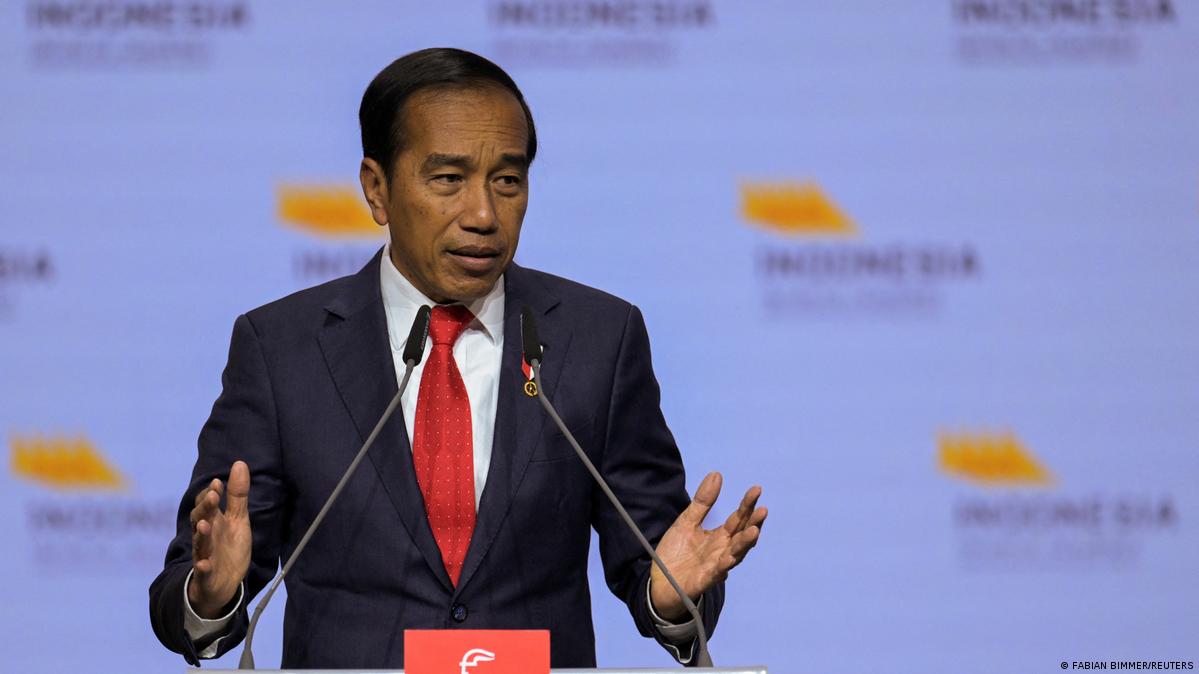Indonesian President Visits Hanover Fair
Indonesian President Visited Hanover Fair: Focus on Economy and Energy Transition

Indonesian President Joko Widodo visits Germany in April.
© FABIAN BIMMER/REUTERSHow was Jokowi's visit organized?
In April 2023, Indonesian President Joko Widodo visited the Hanover Fair in Germany - the world's largest and most important industrial and technology trade fair. Indonesia was already the official guest nation of the Hanover Fair in 2020, but it was cancelled due to the pandemic. In 2021, the fair took place again, but because of the still ongoing pandemic situation, there was only a virtual meeting of Joko Widodo with the then Chancellor Angela Merkel. In 2023, Indonesia now once again was the official guest nation of the Hanover Fair, and Jokowi was coming to Germany on his third attempt for a long-awaited personal visit. On April 16, he gave a speech at the fair's opening ceremony and accompanied Chancellor Olaf Scholz on the traditional Chancellor's tour on Monday.
What is the Hannover Fair?
Since its foundation in 1947, the Hanover Fair has been a platform for international cooperation and the exchange of ideas and technologies. It is the largest industrial technology trade fair in the world and is held every year in Hanover. Over the years, the fair has grown in size and scope and now has over 6,000 exhibitors from around the world. It has also become a platform for government and business leaders from around the world to discuss issues of international importance. This year, the Hanover Fair took place from April 17 to 21.
What Jokowi's visit means for both countries
For the Indonesian government in particular, Joko Widodo's visit to the Hanover Fair is an important symbol of the strong relations between Germany and Indonesia. Widodo's presence at the event is seen as a sign of a strong partnership between the two countries and highlights Indonesia's rising importance in the global economy. The two countries have become close partners, especially in recent years, with Germany providing valuable economic and technical assistance to Indonesia. Moreover, Germany is an important partner in the development of Indonesia's energy sector and is supporting Indonesia to increase its use of renewable energy sources.
Widodo's visit now provides an opportunity for both countries to further develop their partnership. In addition, Indonesia's participation in the fair is a good opportunity to showcase the country's technical advances and innovations. Indonesia's economy is on the road to recovery after the pandemic, with a growth of five percent, mainly due to the high commodity prices of palm oil, nickel, coal, and rubber. These occasionally achieve record prices on international markets. Indonesia's goal now is to increase labor-intensive manufacturing in the country, boost exports and attract new investors. Recently, Indonesia liberalized its investment and labor laws to be more flexible and thus more attractive to international investment.
Indonesia had more than 150 companies as well as 41 ministries/agencies represented at the fair, offering many foreign companies to get in touch with them.
What were German-Indonesian relations like in the past?
Bilateral diplomatic relations between Germany and Indonesia have existed since 1952 and have since been expanded, especially in the areas of politics, economics, education, and culture.
Joko Widodo's visit to the Hanover Fair is therefore just one out of many mutual visits between the two countries' heads of state. The first Indonesian president to visit Germany was Suharto in 1973, and since then every Indonesian president has visited Germany at least once during his term of office; Susilo Bambang Yudhoyono has even visited Germany four times. But many German politicians, such as former German President Christian Wulff or then Chancellor Angela Merkel, also came to Indonesia. In 2012, Merkel adopted the Jakarta Declaration together with former President Yudhoyono during her visit to Jakarta, thus laying the foundation for long-term cooperation between the two countries. In 2022, President Steinmeier visited Indonesia, which underscored the importance of the country, as well as the region, for Germany.
What could German-Indonesian relations look like in the future?
Presidential elections are due in Indonesia in February 2024, in which President Joko Widodo will not be running again. As he is already in his second term, he is not allowed to run for a third time under the Indonesian constitution. However, it can be assumed that close German-Indonesian cooperation will continue in the future. In 2022, Indonesia decided to achieve a 34% share of renewable energy by 2030 and to reduce emissions from the energy sector to zero by 2050. Why is Indonesia acting now? For one, it makes economic sense (increase in GDP, job creation), and for another, it allows Indonesia to attract tangible resources. Under the so-called Just Energy Transition Partnership (JETP), Indonesia will receive US$20 billion over the next few years from a group of industrialized nations including Germany. Indonesia has important decisions to make in the coming months about exactly how it will chart its de-carbonization course. The sooner Indonesia takes more ambitious climate action, the more it will be able to address the problems of poverty and inadequate infrastructure.
----------
Almut Besold is the Head of Friedrich Naumann Foundation for Freedom in Indonesia since 2018. The interview was conducted by Jana Dietrich, who studied at Gadjah Mada University in Yogyakarta for a semester abroad in 2022 and is currently completing an internship at the Foundation's office in Jakarta.

